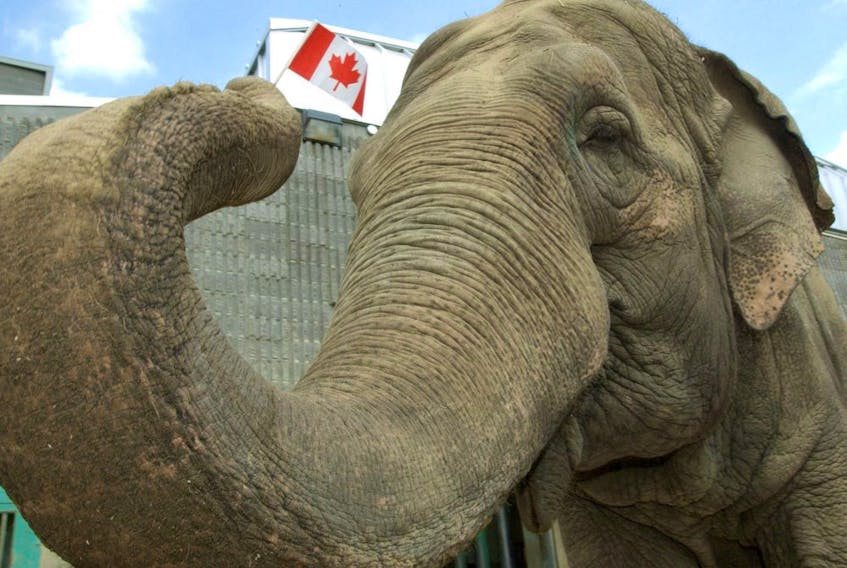EDMONTON, Alta. — For years, activists have been trying to get Lucy, the lone elephant at the Edmonton Valley Zoo, relocated to warmer climes, claiming she’s unwell and lonely — but the latest legal effort by animal rights groups to force the courts to review the conditions of her confinement has failed.
This case is a complicated one, said Peter Sankoff, a University of Alberta legal professor and expert in animal rights law, and is ripe for an appeal to the Supreme Court of Canada, because it raises the issue of how humans are supposed to stick up for animals if courts don’t give them the chance to do so.
“What the applicants are saying here is that Lucy’s interests are very much impacted, but no one’s allowed to go to court on her behalf,” Sankoff said. “That’s what the issue really is in this case and that’s the issue I think the Supreme Court needs to consider.”
Lucy, who came to the zoo in May 1977 and is 42 years old, has attracted high-profile advocates over the years, including Bob Barker, the former host of The Price is Right and Edmonton Oilers enforcer Georges Laraque; each offered to give the city $100,000 if Lucy was moved. Even the Jackass star Steve-O called for her to be moved to a sanctuary when he was in Edmonton for a comedy show in 2011.
Those who say Lucy should stay have argued that any move could kill her, especially because of a respiratory condition that’s exacerbated by stress.

Zoocheck Canada, the appellant, argued the Edmonton zoo was violating zoo standards and that as a result, the province should not have renewed its permit. That would have forced the zoo into compliance, which could have led to Lucy being moved to a different location, said Julie Woodyer, campaigns director with Zoocheck Canada. Lawyers for the province and the city (which owns the zoo) argued the decision to get a licence had nothing to do with where and how Lucy lives.
In this instance, the majority on the Alberta Court of Appeals stuck to an “orthodox” line, Sankoff said, considering only whether Zoocheck Canada had the ability to ask the courts to review the Alberta agriculture and forestry minister’s renewal of the Edmonton Valley Zoo’s licence.
The court concluded they did not have the legal ability to do so, agreeing with the lower court judge’s ruling from 2017 that “the appellants had not demonstrated they had a real stake or genuine interest in the matter they seek to judicially review — the renewal of the Zoo’s permit,” wrote the Alberta Court of Appeal.
“The appellants’ real concern is Lucy’s well-being.”
The appeals court ruled the decision to grant a zoo licence falls under the Wildlife Act, which, the courts said, is not an animal protections law — those are spelled out in the Animal Protections Act.
The judge in the lower court ruling noted this is “counterintuitive” but that “there are other mechanisms that bear upon the treatment of zoo animals like Lucy.” To ask the court to find the zoo had breached animal protections laws would be “premature,” the appeals court concluded, since “no proceedings have been commenced against the zoo under (the Animal Protections Act) by the responsible authorities.”
But in a strongly worded dissent, which Sankoff characterized as “a big deal,” Justice Brian K. O’Ferrall argued: “If animals are to be protected in any meaningful way, they, or their advocates, must be accorded some form of legal standing.”
Woodyer said the ruling sets a “very dangerous precedent” for animals, or even rivers, that cannot launch their own legal challenges.
“It will not just harm this case for Lucy but any cases anyone brings forward for an environmental issue, an animal issue, any time someone doesn’t have a personal interest,” Woodyer said in an interview Tuesday. “It’s not even just about Lucy anymore, it’s about any animal.”
The suit Zoocheck filed in 2017 builds on an earlier case from 2011 involving Lucy, in which Zoocheck, among others, asked the courts to declare her in distress, in violation of the Animal Protections Act, which in turn would’ve forced the zoo into action. The court at the time said they had not used the proper legal channels in that suit; an appellate court concluded the same.
So Zoocheck tried a second legal avenue — the zoo licence route. Arguments were heard in March 2018, and the court released its decision last week. Zoocheck is considering an appeal to the Supreme Court of Canada, said Woodyer. The Post reached out to the province for comment, but it was unable to meet the Post’s deadline.
“There continues to be a very determined group that are interested in Lucy’s future and … we have a shared concern for doing what’s best for her,” said Lindsey Galloway, the zoo director. “If something in her condition changes then there’s something to talk about, but as long as her health is at risk, our obligation is to take really good care of her here in the zoo. And that’s what we’re doing.”
• Email: [email protected] | Twitter: tylerrdawson
Copyright Postmedia Network Inc., 2019









